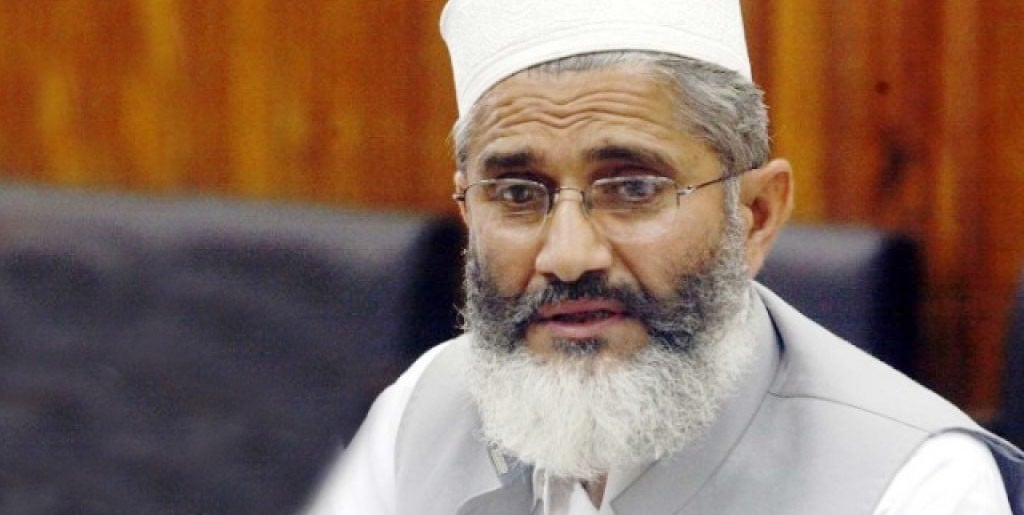
The job of mediation has brought Sirajul Haq to the centre of mainstream politics, shown his worldview as distinct from the previous amir and exposed the fissures within the party

In the current political stalemate triggered by the Inqilab and Azadi dharnas, Jamaat-e-Islami’s Sirajul Haq, the newly elected agile amir, has taken up the role of a mediator and fire-fighter reminding of the political elder Nawabzada Nasrullah Khan. Facilitating a dialogue between the seemingly uncompromising Imran Khan and Tahirul Qadri and the government is a commendable effort has earned him goodwill among the masses. But his efforts are unlikely to succeed for several reasons.
He says he has the solution wherein every stakeholder in the conflict will get something without compromising on their demands. But there are problems here. He has not been authorised by any party in the conflict for he has no stance on certain important aspects of the crisis or hasn’t made it public even if he has.
Does Haq believe the elections were massively rigged as Imran Khan alleges? What is his position on the PM’s resignation? Does he support Khan’s strategy of removing the Khan government through street power or his call for civil disobedience? Does he accept the current crisis is a tussle between forces of status quo or change, or a fight between two viewpoints?
Without having any stand on these and other issues is tantamount to adopting a strategy and a line of action without first having formed a viewpoint on the issue. Unless one has a clear agenda and terms of references for the dialogue and has the courage to shun unwarranted humility and courtesy and neglect party interests that bar you from displeasing or taking sides with or against someone, one cannot be a successful mediator.
Haq, it seems, is in favour of accepting some demands of Khan but is convinced his strategy is wrong. While Haq has made the resignation of PM conditional with the findings of the judicial commission, he hasn’t made his stance public.
JI eyes a coalition with the PML-N in near future. It could even be an ally of the PPP in future. Khan’s calling the two big parties as corrupt and hands in glove with each other, his being soft on militancy and hard on military operation, and strategy of dharna/mob agitation has similarities with the Jamaat under the late Qazi Husain Ahmad, the former amir of JI. But the current Jamaat is not interested in dharna politics, boycott or resignations from assemblies. Yet it is not opposing Imran Khan.
Some believe JI and PTI are polls apart as far as their objectives, strategies, style and preferences are concerned and dub their coalition as a marriage of convenience. JI workers oppose Khan for his style and strategy privately, though they are reluctant to say it on record for they don’t want to forego their alliance and assembly seats and ministries for that matter.
"Jamaat’s efforts for compromise are laudable but it needs to part ways with the PTI especially after the revelations of Javed Hashmi because JI is for constitutionalism and democracy while PTI is indulging in anarchic politics. Besides, PTI is a liberal party arranging music nights in dharnas while JI is a religious party that observes Hijab day. It doesn’t want, and rightly so, to lose its ministries and assembly seats," says a political worker wishing anonymity.
Haq, it seems, may also push the Jamaat away from its jihadi paradigm of the 1990s and the radical tendencies of its previous Amir Munawar Hasan to its original preaching, democratic, constitutional paradigm of Syed Abul Ala Maududi era. Maududi never approved of jihad by private outfits without a formal declaration of war by the state.
Even though Haq was embarrassed by Khan when his suggestion to the prime minister of recounting in ten constituencies was disowned by Khan, he can still try to save both Khan and PTI from committing political suicide and the country from economic, social and political threats and losses.
Sirajul Haq also has to decide whether JI is an Islamic movement or a political party. The demands, preferences and strategies of the two are invariably distinct and often conflicting. As an Islamic movement, the entire nation is its audience, so it cannot be a party in a political tussle. As a political party, others are its rivals and it has to take sides and compete with them for its political survival.
Though JI has failed to become a popular political/electoral force, it has had a huge influence on the society, politics and national priorities. In its endeavours to become a popular force, it lost its identity as an ideological religious movement and could not become a big party either. It is because even though Pakistanis respect its social services -- JI’s Al Khidmat Foundation is doing commendable work for the temporarily displaced persons in KP -- they are not ready to support it as a political party.